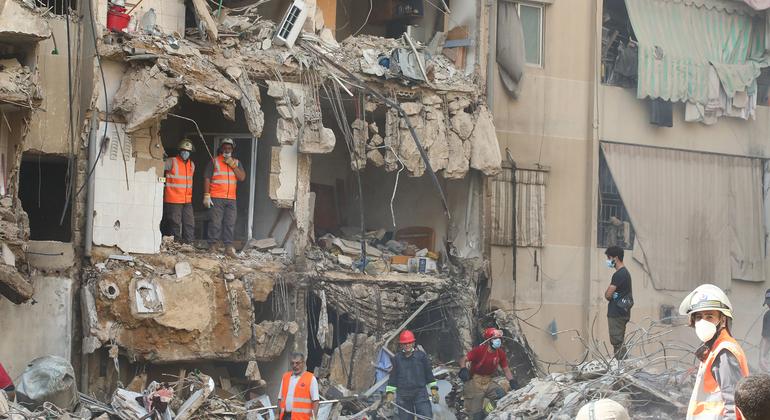The Secretary-General of the United Nations, António Guterres, expressed deep concern this Saturday for the dramatic escalation of violence in Beirut, Lebanon, which has intensified in the last 24 hours. This situation was triggered by Israeli airstrikes in the southern suburbs of the city, which reportedly resulted in the death of the leader of the armed group Hezbollah, Hassan Nasrallah.
The violence between Israeli forces and Hezbollah has increased along the UN-patrolled separation line in southern Lebanon, known as the Blue Line. This conflict is taking place in the context of the nearly year-long war in Gaza, where the humanitarian and security situation remains critical.
In a statement, Guterres’ spokesperson, Stéphane Dujarric, emphasized the urgency of halting the cycle of violence, urging all parties to step back from the “brink of the abyss.” Guterres stressed that neither the people of Lebanon nor Israel, nor the region as a whole, can afford a total war. Faced with this grave situation, the Secretary-General called on the parties involved to commit to the full implementation of UN Security Council Resolution 1701, which aims to end hostilities and establish a demilitarized zone in southern Lebanon.
The airstrikes have caused a new wave of mass displacement. In response to the humanitarian crisis, the United Nations Children’s Fund (UNICEF) has expanded its shelter operations, distributing emergency supplies to over 5,000 displaced persons. Additionally, the UN Refugee Agency (UNHCR) has reported an increase in the flow of people towards the Lebanon-Syria border, where newcomers, including women, children, and the elderly, are in critical conditions after long journeys with no access to food or water.
According to figures provided by the International Organization for Migration (IOM), a total of 211,319 people have been displaced since October this year due to cross-border incidents.
The United Nations Relief and Works Agency for Palestine Refugees (UNRWA) has also begun responding to the crisis, opening seven emergency shelters that currently house 1,600 people, both Lebanese and Palestinian and Syrian refugees. Its head, Philippe Lazzarini, warned that many of the displaced are traumatized by the continuous bombardments and constant fear they face. Lazzarini called for the protection of civilians and the avoidance of attacks on civilian infrastructure, warning that any expansion of the conflict would only bring more suffering to the civilian population.
Source: MiMub in Spanish
